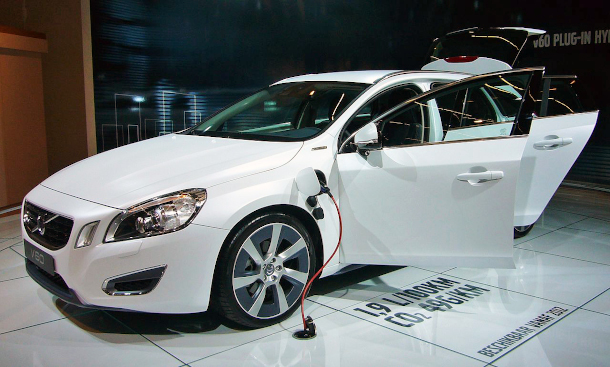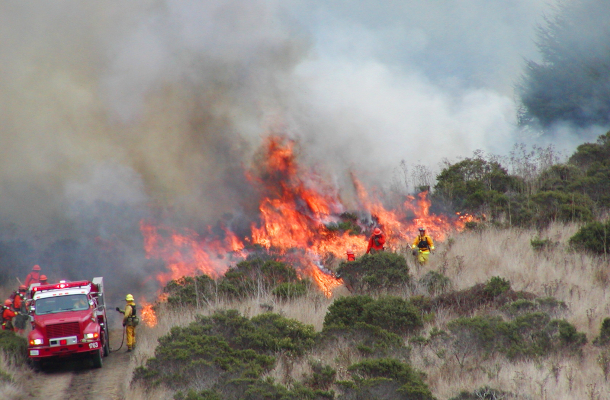Beyond the Headlines
Air Date: Week of March 12, 2021

The Volvo V60 Plug-in Hybrid. The Swedish company is planning on going all-electric by 2030. (Photo: Overlaet, Wikimedia Commons, CC BY-SA 3.0)
For this week’s Beyond the Headlines segment, Environmental Health News Editor Peter Dykstra and Host Steve Curwood look at Volvo forging ahead with a commitment to go all-electric by 2030. Next, they discuss how smoke from the devastating California wildfires can irritate the lungs, increasing the risk of contracting more severe cases of COVID-19. They then turn back to March 1971, when the U.S. Army Corps of Engineers undertook an ill-conceived project to channelize the Kissimmee River in Florida.
Transcript
CURWOOD: Well, it's time for a look beyond the headlines now with Peter Dykstra. Peter's, an editor with Environmental Health News, ehn.org and dailyclimate.org. On the line now from Atlanta, Georgia, where it's got to be spring there, Peter. I mean, we still have some ice and snow up here but you've got the flowers huh.
DYKSTRA: We got 70 degrees, the flowers are starting, the birds are starting. And of course the legendary Atlanta pine pollen has started, where you can pretty much take a pine pollen shovel and shovel the sidewalks. There can be little pollen drifts everywhere. Not so good if you have hay fever, otherwise, spring is glorious here.
CURWOOD: Okay, so what do you have for us today?
DYKSTRA: Well, there's some potential good news for clean energy coming out of Sweden, where Volvo has announced their intention to sell electric cars and electric cars only by the year 2030. And that's way before any other carmaker has made a commitment.
CURWOOD: Car makers, we should add though, in the West, I think that the majority of Volvo is now held by a Chinese concern. And China has been really gung ho on electrifying their car fleet.
DYKSTRA: They have and that may help China further dominate the electric car market. But it's also caused a little bit of unease because Volvo is such an iconic brand for Swedes. Having said that, the business side of Volvo has actually done a lot better in recent years under Chinese ownership.
CURWOOD: I imagine there's some folks in Sweden who maybe don't see this development as progress.
DYKSTRA: That's the case. But there's a third nation involved in this, where it's been taken with a little bit of concern. China's powerful economic neighbor, Japan had such success with the hybrid gas electric cars, particularly the Prius from Toyota, that they're way behind on fully electric vehicles.
CURWOOD: Yeah I mean, the Prius first came out in 1997. They sold quite a few of those. I imagine they don't want to let go of that model. But sooner than later, you know, fossil fuel gasoline is not going to be the way to go. What else do you have for us today Peter?
DYKSTRA: Story from California about wildfire smoke more and more reaching into communities. Partly because those communities are reaching more and more into the forest. And wildfire smoke could be getting more toxic to humans, because you're not just burning trees anymore. Homes filled with plastic and other burnables that can create a lot of irritation for lungs.

Specialists conducting a prescribed burn in California. Prescribed burns rid a forest of dead leaves, tree limbs, and other buildup and can help prevent large destructive wildfires. (Photo: Ken-ichi Ueda, Flickr, CC BY-NC 2.0)
CURWOOD: Well, that's right. Sometimes when you burn plastic, you get chemicals akin to certain kinds of dioxins and that that's not good for us.
DYKSTRA: Well, it's not good for us in another way, because the CDC has studied the effect of wildfire smoke on coronavirus. And what they found is that all of those particulates, all of the irritants, they make it easier for coronavirus to catch on in the lungs.
CURWOOD: It would make for more serious cases and perhaps even more fatalities. It's not a good development. Hey, why don't you take a look now back in history and tell me what you see.
DYKSTRA: I'm going to go back 50 years to the spring of 1971, along the month of March. The US Army Corps of Engineers completed an 11 year flood control project to channelize the Kissimmee River, which meanders all the way from Central Florida, around Orlando, south to the Everglades. They took 100 miles of this shallow winding river and turned it into a deep, straight 56 mile ditch. Solving the flood problem, but creating another one.
CURWOOD: Yeah, that's right. So the river of grass, which is another name for the Everglades, that people have used, that that whole ecosystem needs slow running water. So what did they do about that?
Rep. Soto Kayaks Kissimmee River Restoration from SFWMD on Vimeo.
(Video: Restoring the Kissimmee River, SFWMD, Public Domain)
DYKSTRA: What happened was pretty remarkable. Scientists and activists and others, persuaded the Army Corps of Engineers that a big mistake had been made. And Congress appropriated money to put the bends back in the river, and the Kissimmee River is now partly restored. And it's made a big difference to its natural flow, and to the prospects of eventually saving the Everglades from all the human intrusion that have put the Everglades this beautiful system into peril.
CURWOOD: This is a case where science really was able to get through with this message and having caused a problem for nature, at least we took some steps to rectify it.
DYKSTRA: That's right.
CURWOOD: Hey, thanks, Peter. Peter Dykstra is an editor with Environmental Health News, that's ehn.org and dailyclimate.org. We'll talk to you again real soon.
DYKSTRA: Okay, Steve, thanks a lot. Talk to you soon.
CURWOOD: And there's more on these stories on the Living On Earth website. That's loe.org.
Links
Volvo to go completely electric by 2030
The Guardian | “California Wildfire Smoke Compared To Vehicle Emissions”
Living on Earth wants to hear from you!
Living on Earth
62 Calef Highway, Suite 212
Lee, NH 03861
Telephone: 617-287-4121
E-mail: comments@loe.org
Newsletter [Click here]
Donate to Living on Earth!
Living on Earth is an independent media program and relies entirely on contributions from listeners and institutions supporting public service. Please donate now to preserve an independent environmental voice.
NewsletterLiving on Earth offers a weekly delivery of the show's rundown to your mailbox. Sign up for our newsletter today!
 Sailors For The Sea: Be the change you want to sea.
Sailors For The Sea: Be the change you want to sea.
 The Grantham Foundation for the Protection of the Environment: Committed to protecting and improving the health of the global environment.
The Grantham Foundation for the Protection of the Environment: Committed to protecting and improving the health of the global environment.
 Contribute to Living on Earth and receive, as our gift to you, an archival print of one of Mark Seth Lender's extraordinary wildlife photographs. Follow the link to see Mark's current collection of photographs.
Contribute to Living on Earth and receive, as our gift to you, an archival print of one of Mark Seth Lender's extraordinary wildlife photographs. Follow the link to see Mark's current collection of photographs.
 Buy a signed copy of Mark Seth Lender's book Smeagull the Seagull & support Living on Earth
Buy a signed copy of Mark Seth Lender's book Smeagull the Seagull & support Living on Earth

